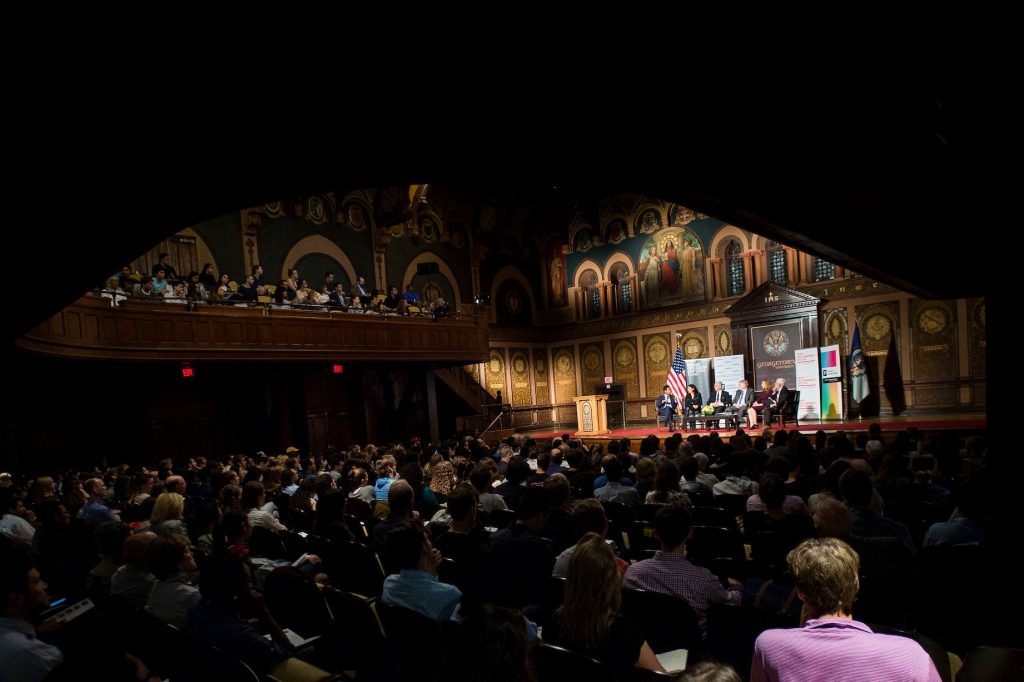Did You Miss ‘Secrets and Leaks’? We’ve Got You Covered.

By Free Speech Project Staff
Fighting for freedom of the press and protecting the safety of journalists is crucial now more than ever. The Free Speech Project was proud to convene a panel of experts on the tense relationships among journalists, whistleblowers, and those in the national security establishment Sept. 24 before a near-capacity crowd in Georgetown University’s historic Gaston Hall.
Our panelists included Jameel Jaffer, director of the Knight First Amendment Institute at Columbia University; Laura Poitras, a documentary filmmaker who reported on the U.S. government’s surveillance program after receiving classified information from Edward Snowden; Alberto Mora, former general counsel of the U.S. Navy known for leaking information about torture at Guantanamo Bay; Martin Baron, executive editor of The Washington Post; and Carrie Cordero, former counsel to the Office of the Director of National Intelligence. The conversation was moderated by Project Director Sanford J. Ungar.
Missed the program? Check out video from Georgetown, as well as notable quotes from press mentions, below:
America Must Protect The Freedom of The Press, Panelists Say (The Hoya)
“People are afraid,” Baron said of potential government sources. “They’re afraid they’ll be prosecuted; they’re afraid of being blackballed, that they’ll be shifted into a lower-level position or into some obscure corner office.”
Jaffer said the White House’s public attitude toward the media affects not only government sources but also journalists.
“I think that the statements that the White House is putting out there have an inevitable, and I think quite deliberate, chilling effect on would-be leakers and probably on journalists too,” Jaffer said. “I think they’re a lot more careful about decisions with sources than they might have been 10 years ago.”
Secrets and Leaks: Whistleblowers, Journalists, and National Security (School of Foreign Service)
A further theme of the event was the technological context in which these interactions between government officials, whistleblowers, and journalist are carried out. … Poitras, providing the viewpoint of a journalist, highlighted how new technology requires those in her field to be experts in digital security to avoid becoming a target of the government seeking to unveil a whistleblowing source.
Cordero stated that there has been an uptick in leaks, both in number and scope: today, someone can leave a government building with a flash drive containing one and a half million documents, rather than concealing a few papers in a briefcase, she reported. From a national security standpoint, this makes leaks far more dangerous.
Jaffer, however, argued that the government’s tendency to excessively classify information increases the value and importance of having whistleblowers able to spread information the public deserves to know.
To Keep It a Secret or Leak It? (On the Record)
Baron … took the last word of the night, speaking about the importance of public skepticism and the need to question the government. … He left the audience with the message that the public should serve as a check on government and that the press should serve as a vehicle to help such an active citizenry check their government when needed.
In addition to the Free Speech Project, support for the forum came from the Knight Foundation, the Knight First Amendment Institute, and the Press Freedom Defense Fund. Additional campus support was provided by The Hoya and the Georgetown University Lecture Fund.